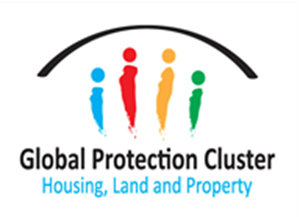About Us

Background
The Global Protection Cluster (GPC) was established in 2005 as a result of the Humanitarian Response Review and is led by UNHCR. To improve the predictability, speed and effectiveness of the protection response in emergencies, the GPC developed a Framework for UN Managerial Responsibility and Accountability for the Protection of Internally Displaced Persons and Affected Populations in Complex Emergencies, which was presented and endorsed by the IASC Principals in 2005. The Framework defined the different Areas of Responsibility (AoR) within the Protection sector, including Housing, Land and Property (HLP), and identified focal point agencies to assume responsibility and accountability for each AoR. The HLP AoR has not functioned adequately for the past two years, with coordination and leadership being dormant. The members of the HLP AoR agreed on the 2nd of September 2015 to reactivate the HLP AoR under a new leadership structure with a revised scope.
With the reactivation of the HLP AoR, it has been agreed by partners that the AoR shall focus on HLP issues arising in the emergency/early recovery phase of a humanitarian crisis (including both conflict and disaster) and, more particularly for the duration that the Protection Cluster is officially activated in that particular country. Furthermore, the already established Solutions Alliance Rule of Law Thematic Group will be responsible for coordinating HLP issues in the reconstruction and development phase. However, it is understood that there must be consistent coordination and communication between both entities.
The HLP AoR facilitates a more predictable, accountable and effective response by coordinating and providing global-level inter-agency policy advice and guidance on HLP protection concerns that arise in humanitarian action, complex emergencies and natural disasters.
The overall objective of the HLP AoR is to facilitate a more systematic approach to addressing HLP issues on the ground. This will be done by promoting collaboration and complementarity of efforts amongst agencies undertaking HLP activities and by addressing gaps in policy and technical areas.
The HLP AoR is a broad-based and participatory forum which can comprise UN Agencies, non-governmental and other international organisations, research and academic institutions, donors, human rights and development agencies and representatives of relevant clusters.
The HLP AoR will hold regular meetings convened by the co-chairs, who will disseminate minutes. Addressing HLP rights is an issue relevant to the activities of other clusters; therefore, the HLP AoR will collaborate directly with these as and when required. The HLP AoR will report to the GPC through regular presentations by the co-chairs, who will also provide regular updates from the GPC meetings to the HLP AoR in order to direct activities and focus.
- Provide support to country-level HLP AoRs and field requests.
- Review and ratify a bi-annual Workplan, which should contain a set of prioritised activities, envisaged outputs and timelines, and outlines responsible and collaborating organisations.
- Define and prioritise the HLP AoR resource requirements, to inform the development of harmonised, inclusive and transparent resource mobilisation efforts by the HLP AoR cochairs.
- Review and endorse such HLP AoR advocacy strategies, position statements and papers on global issues as required, including but not limited to the need to strengthen the overall HLP response capacity.
- Ensure adequate integration of HLP guidance into the inter-cluster initiatives and crosscutting issues.
- Review, ratify and monitor adherence to global standards and benchmarks for country-level HLP coordination.
- Provide capacity building for humanitarian actors.
- Inform the GPC contribution to IASC strategic priorities.

